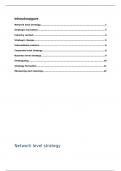Summary
Methodology & Data Analysis 1 - Summary
- Course
- Institution
Includes content taken primarily from the slides and exercises offered in Quarter 3 from the Methodology & Data analysis 1 class from Saxion Enschede’s International Business & Management Studies. Additional images/tables to help studying are included.
[Show more]





